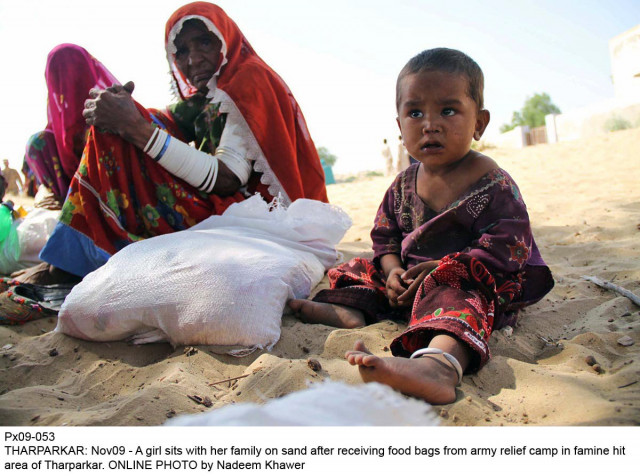Pangs of hunger: Thar most food insecure area of Sindh, says speaker
Representatives of NGOs, government officials and experts were part of the discussion

PHOTO: ONLINE
Karachi is the only 'food secure' place in Sindh and Thar is simply the most insecure one.
Stressing the need of food safety in areas such as Thar, Sindh Irrigation and Drainage Authority training coordinator Masroor Ahmed Shahwani expressed his views among others at a discussion on rural entrepreneurship and food shortage at Pearl Continental hotel on Thursday. Representatives of NGOs, government officials and experts were part of the discussion. The event was a provincial conference organised by Participatory Development Initiatives.
"According to the World Bank, 43 per cent of Pakistani employment is in the agriculture sector," he said. "[Despite that], there is a lack of investment in agriculture." He added that even when there are schemes and opportunities, the big landlords take them up instead of the owners of small portions of land.

Talking about food shortage and insecurity, Hussain Buksh Mala from Collective for Social Science Research spoke about how hunger is considered shameful. "Hunger is considered a stigma," said Mala, who has done extensive research on rural Sindh, especially Dadu. "People don't reveal in their communities that they are hungry and haven't had food; but children do when they go to visit their grandparents or neighbours. That is how we get to know about hunger."
Hisaar Foundation representative Sono Khangharani contrasted the emergency threshold of Thar with that of the world. "According to the World Food Programme, the emergency threshold is 15 per cent around the world as compared to 21 per cent in Thar," he said.
Khangarani was of the view that the problems in Thar prevail due to the absence of political accountability in the region. "Only seven per cent of the families in Thar have the ability to buy food while the remaining 93 per cent don't," he said. "Eighty per cent of the population in Thar takes loans to buy food which are not repaid for the next four to five years. There is no intervention to break this cycle."
Talking about rural entrepreneurship, Sindh Chamber of Agriculture lower Sindh vice-president Kabool Muhammad Khatian spoke about the demand of Sindhi patchwork quilts and ajrak. "Any foreigner who comes to Sindh asks for rilli but nobody understands its [importance] here," he said. "Same goes for the ajrak industry which is very important."
He discussed his experience in the Jaipur district of India. "There are at least 200 five-star hotels in Jaipur, which is a desert," he said. "The reason why they are progressing is because they are preserving their culture." According to him, all the developed countries in the world practice corporate farming. "Banks are ready to invest in big farms but we do not have an agriculture policy in Sindh," said Khatian.
Murad Ali Khushko, the only farmer present at the conference, voiced his concerns and said that farmers are the ones who work hard yet are the ones who are also exploited. "You people of the city!" said an emotional Khushko. "Wear your fancy clothes and sit comfortably. We sow the seeds and grow food."
Besides Khushko, a woman dressed in a traditional ghagra choli [long skirt and blouse] belonging to the Azhar Palli village of Umerkot sat silently with her husband during the conference. They were the odd ones out with a clueless expression on their faces as they were unable to understand English. Their problems were being discussed in a language they could not understand that too, at a place they could not relate to at all.
Published in The Express Tribune, May 1st, 2015.



















COMMENTS
Comments are moderated and generally will be posted if they are on-topic and not abusive.
For more information, please see our Comments FAQ